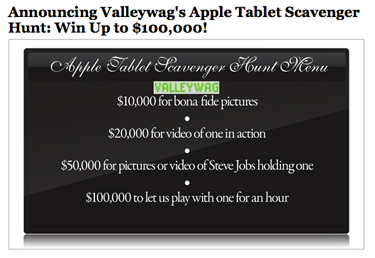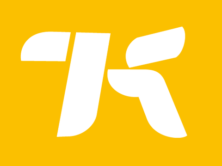
Screen grab from ValleyWag's Apple Tablet "Scavenger-hunt".
If paying sources surreptitiously–through an airplane ticket, a hotel room, or even just a boost in their professional status–seems too tame, Gawker has the game for you.
The site offered monetary rewards for anyone who could get them information, photographs, or access in advance of the new Apple tablet. Ben Sheffner, writing at Salon.com, argues Gawker’s extreme move does more than compromise ethics; it may also break the law.
Sheffner writes,
[Gawker’s Silicon Valley site,] Valleywag, said it had “had enough of trying to follow all the speculation” about the product and set out a “menu” describing what it would pay for info, ranging from $10,000 for “bona fide pictures” to $100,000 for anyone who could physically deliver the tablet to the editors and “let us play with one for an hour.”
In an article about paying sources at the Digital Journalist, Karen Slattery and Mark Doremus write, “Of course, paying sources with cold cash is just one way to reward a source for information. Assisting with book and movie deals, as well as footing the bill for hotels, transportation, laundry and the like are other, equally problematic ways to curry favor with sources.” Any of these practices reduce journalistic competition, which Slattery and Doremus argue is an ethical necessity to create news in the public interest. But Gawker’s contest, Sheffner argues, goes beyond even these ethical questions.
Apple served the site with a cease and desist order according to Sheffner, who writes,
The letter, from Orrick, Herrington & Sutcliffe’s Michael Spillner, accuses the site of “inducing a misappropriation of trade secrets in violation of California trade secret law” and “inducing breach of contract,” and threatens legal action against Gawker and “anyone who makes an illegal submission to you in response to the offer.”
“Is Apple just huffing and puffing, hoping that Gawker folds without a fight? Or does it actually have a case against the site for engaging in what might be described as a form of corporate espionage?” he asks. “Does the First Amendment give Gawker the right to report by a paid, crowd-sourced ‘scavenger hunt’?”
According to Sheffner, while the First Amendment protects a whole lot, it doesn’t “give reporters a free pass to break laws that the rest of us have to obey.” Sheffner writes the Supreme Court stated this clearly in 1937 and, again, in 1991. In that light, Apple’s allegation that the blog is inducing people to break the law does hold water, Sheffner writes.
Previous cases that Sheffner cites paint a varied picture of how disputes like this can pan out. Though bloggers in California are protected by a state ‘shield law,’ when laws protecting trade secrets and First Amendment rights collide, sometimes trade secrets win, Sheffner writes. And while Gawker writes that they “encourage you to stay within the bounds of the law,” it must be clear to them that if anyone does produce what they’re buying, it would likely be a breach of that person’s confidentiality obligations.
Sheffner hits on a last, more telling ethical question when he moves beyond the issue of the tablet reward to look at journalism’s role as an overall inducer of illegal activity. It’s not just Gawker that’s asking sources to compromise themselves ethically or legally. Mainstream journalists do it too. “Gawker calls it a ‘scavenger hunt’; others call it ‘reporting,’” he writes. “Perhaps what’s most surprising is that it doesn’t lead to more lawsuits.”





